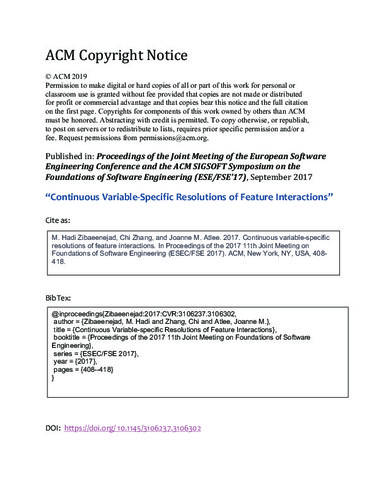| dc.contributor.author | ZIbaeenejad, Mohammad Hadi | |
| dc.contributor.author | Zhang, Chi | |
| dc.contributor.author | Atlee, Joanne M. | |
| dc.date.accessioned | 2019-12-23 15:43:43 (GMT) | |
| dc.date.available | 2019-12-23 15:43:43 (GMT) | |
| dc.date.issued | 2017-09 | |
| dc.identifier.uri | https://doi.org/10.1145/3106237.3106302 | |
| dc.identifier.uri | http://hdl.handle.net/10012/15372 | |
| dc.description | © ACM 2019
Permission to make digital or hard copies of all or part of this work for personal or classroom use is granted without fee provided that copies are not made or distributed for profit or commercial advantage and that copies bear this notice and the full citation on the first page. Copyrights for components of this work owned by others than ACM must be honored. Abstracting with credit is permitted. To copy otherwise, or republish, to post on servers or to redistribute to lists, requires prior specific permission and/or a fee. Request permissions from permissions@acm.org. | en |
| dc.description.abstract | Systems that are assembled from independently developed features suffer from feature interactions, in which features affect one another's behaviour in surprising ways. The Feature Interaction Problem results from trying to implement an appropriate resolution for each interaction within each possible context, because the number of possible contexts to consider increases exponentially with the number of features in the system. Resolution strategies aim to combat the Feature Interaction Problem by offering default strategies that resolve entire classes of interactions, thereby reducing the work needed to resolve lots of interactions. However most such approaches employ coarse-grained resolution strategies (e.g., feature priority) or a centralized arbitrator.
Our work focuses on employing variable-specific default-resolution strategies that aim to resolve at runtime features- conflicting actions on a system's outputs. In this paper, we extend prior work to enable co-resolution of interactions on coupled output variables and to promote smooth continuous resolutions over execution paths. We implemented our approach within the PreScan simulator and performed a case study involving 15 automotive features; this entailed our devising and implementing three resolution strategies for three output variables. The results of the case study show that the approach produces smooth and continuous resolutions of interactions throughout interesting scenarios. | en |
| dc.description.sponsorship | NSERC Discovery Grant, 155243-12 ||
Ontario Research Fund, RE05-044 ||
NSERC / Automotive Partnership Canada, APCPJ 386797 - 09 | en |
| dc.language.iso | en | en |
| dc.publisher | ACM | en |
| dc.title | Continuous Variable-Specic Resolutions of Feature Interactions | en |
| dc.type | Conference Paper | en |
| dcterms.bibliographicCitation | M. Hadi Zibaeenejad, Chi Zhang, and Joanne M. Atlee. 2017. Continuous variable-specific resolutions of feature interactions. In Proceedings of the 2017 11th Joint Meeting on Foundations of Software Engineering (ESEC/FSE 2017). ACM, New York, NY, USA, 408- 418. | en |
| uws.contributor.affiliation1 | Faculty of Mathematics | en |
| uws.contributor.affiliation2 | David R. Cheriton School of Computer Science | en |
| uws.typeOfResource | Text | en |
| uws.peerReviewStatus | Reviewed | en |
| uws.scholarLevel | Faculty | en |
| uws.scholarLevel | Post-Doctorate | en |
| uws.scholarLevel | Graduate | en |

